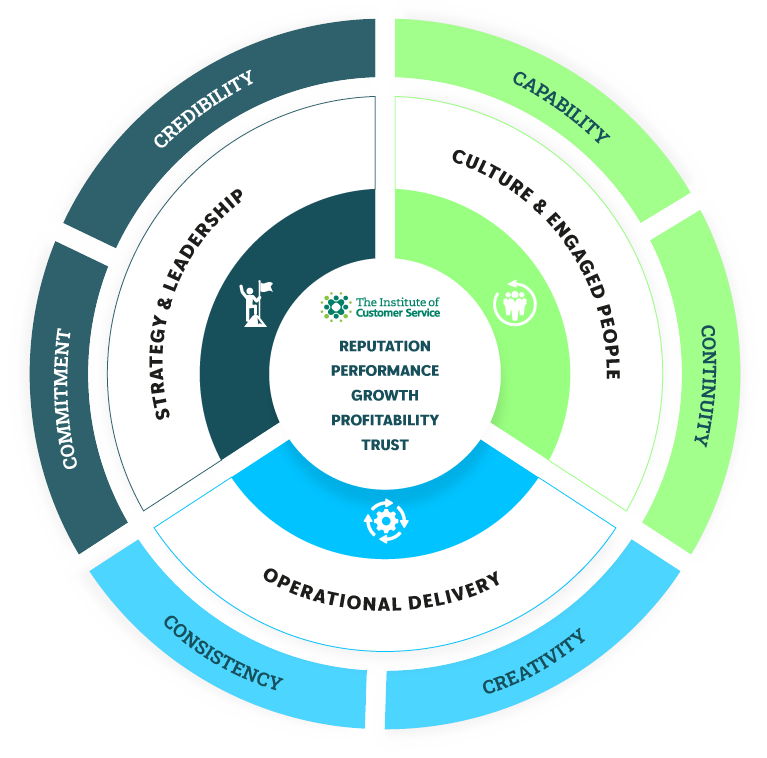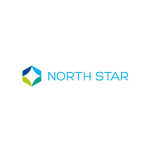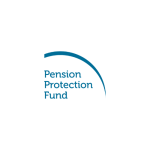As the UK’s authority on customer service, we set and continually update the high standards that our members rely on. Our accreditations, such as ServiceMark and TrainingMark, impose strict criteria to ensure that only the highest performing organisations can showcase their excellence.
We also integrate our professional standards into all our products and services. We endorse relevant standards like the National Occupational Standards for customer service, supporting exceptional customer service delivery across various sectors.

Our Service Experience model
Our Service Experience Model is intricately woven into our products and services. It is a framework that highlights all the key elements required for delivering great customer outcomes, in areas such as strategy and leadership, culture and engaged people, and operational delivery.
The model also facilitates the development of skills to drive positive changes and future-proof customer experiences with our members.
Founded on five inter-dependent financial and reputational outcomes, our interactive model focuses on enhancing each of these elements in relevant and sustainable ways.
The core supports three strategic independent ‘pillars’: each must play its part if customer service excellence is to be consistently delivered and maintained.
We have developed a detailed standards framework, which includes multiple codes of practice. This framework is designed to empower trainers, assessors, and service users with the confidence and knowledge to excel in the field of customer service, keeping them up to date with the latest industry trends.

Accreditation
- ServiceMark: a national standard, independently recognising an organisation’s achievement in customer service and its commitment to upholding those standards
- TrainingMark: provides independent recognition of national standards for organisations that have, or are developing, in-house customer service or call centre training programmes

Benchmarking
- Business Benchmarking: an independent measurement of customer satisfaction that organisations can use to benchmark against national leaders in their sector and beyond
- ServCheck: measures how engaged your employees are with your customer service strategy
- Trust Index: helps you measure, monitor, and build trust with customers
We are very proud of the success of our members who have driven real transformation into their businesses with customer service excellence. Find out more about their journeys below:
As the professional body for customer service, The Institute develops and draws on a wide range of service related standards to support organisations and individuals in delivering excellent customer service experiences. Standards are built into all Institute products and services to provide effective and consistent measures of service related performance. We also promote the use of other relevant standards such as the National Occupational Standards for customer service.
All Approved Trainers must comply with The Institute Trainer Code of Practice. This code strengthens current approval and quality requirements for Trainers. It applies to all Institute approved Trainers and contains 16 requirements, each accompanied by guidance explaining how they might be met in practice.
All Institute Assessors must comply with the Assessor Code of Practice. This code strengthens current approval and quality requirements for Assessors. It applies to all Institute approved Assessors and contains 10 requirements, each accompanied by guidance explaining how they might be met in practice.
You can use the following links to find a wide variety of information:
To find out details about the appropriate course of action, please view our Exceptions Policy.
If you have any questions on the Codes please contact The Institute’s Standards and Quality team on 020 7620 2640 or email the Standards and Quality team via S&QTeam@icsmail.co.uk.
Each year, a sample of assessors and trainers are contacted and asked to complete a mandatory compliance exercise which includes a professional discussion. Any development areas or areas of non-compliance are identified and The Institute will work with the individual to provide support and guidance, aiming to help them achieve full compliance.




